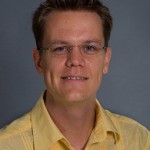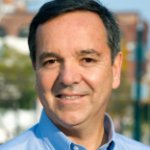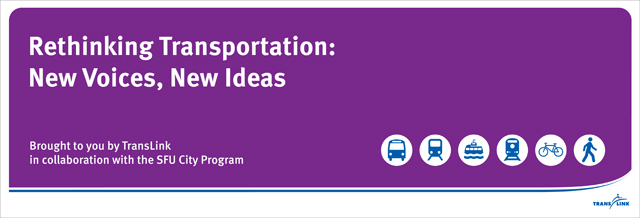Rethinking Transportation: New Voices, New Ideas – talks from Markus Moos and Gil Peñalosa
Rethinking Transportation: New Voices, New Ideas – talks from Markus Moos and Gil Peñalosa
Exciting news – Rethinking Transportation: New Voices, New Ideas, brought to you by TransLink in collaboration with the SFU City Program, is back at Simon Fraser University!
Event Details on both talks:
Markus Moos
Date: Tuesday, September 16, 7 p.m.
Location: Room 1400, SFU Harbour Centre, 515 West Hastings, Vancouver
Admission: Free, but reservations are required. Reserve
Live Webcast: http://creative-services.sfu.ca/broadcast/
Gil Peñalosa
Date: Wednesday, September 17, 7 p.m.
Location: Djavad Mowafaghian Cinema, Goldcorp Centre for the Arts, SFU, Woodwards Building, 149 West Hastings Street, Vancouver
Admission: Free, but reservations are required. Reserve
Live Webcast: http://creative-services.sfu.ca/broadcast/
Markus Moos, Assistant Professor, School of Planning at the University of Waterloo will be speaking on Tuesday, September 16, 7 p.m., at SFU Harbour Centre. The talk, The New Generation: Are Millennials Changing the Game?, will take a look at how Millennials’ values, preferences and priorities could affect your work, commute, home and community — now and in the future.
Internationally acclaimed “healthy cities” expert Gil Peñalosa will be speaking the following day – Wednesday, September 17, at SFU Woodward’s at 7 p.m. His talk is titled, Future Livability: Boast or Bust?, will explore whether Metro Vancouver can maintain its “Livability Credibility” for the next 30 years.
Admission is free for both talks, but reservations are required. Visit www.sfu.ca/rethinking-transportation to register. Unable to attend? Both talks will be available as a free webcast online at creative-services.sfu.ca/broadcast/.
You can tweet your questions and comments using the hashtag #movingthefuture.
Rethinking Transportation: New Voices, New Ideas is a speakers’ series focused on key transportation issues and opportunities facing the Metro Vancouver region. The series will explore new perspectives on the movement of people and goods in cities with thought leaders, decision makers, and experts from across North America who have tackled some of the most pressing transportation challenges.
The New Generation: Are Millennials Changing the Game?

Millennials’ values, preferences and priorities could affect your work, commute, home and community – now and in the future.
The New York Times has mentioned “Millennials” 122 times between January and August 2014 on topics ranging from TV and pop music to travel and literature. Why the interest?
Millennials, born between the early 80s and the new millennium, are a significant and influential demographic—outnumbering even the baby boomers. The roughly 9 million Millennials across Canada and over 500,000 here in Metro Vancouver think, communicate, travel and work differently. Understanding how they impact housing, transportation, jobs and communities is critical for planners, employers, real estate and technology developers, and anyone who interacts with this new wave of change-makers.
Far fewer Millennials have driver’s licences than previous generations, which is particularly relevant as we reach a critical juncture in transportation planning in our region with 1 million more people expected to join us by 2040.
Join Dr. Markus Moos, Assistant Professor in the School of Planning at the University of Waterloo to learn more about how Millennials are different from young adults in Metro Vancouver 20 to 30 years ago; how their housing and commuting decisions are different from their previous cohorts; and —perhaps most importantly—what this means for transportation and housing in Metro Vancouver and beyond.
About the Speaker
Dr. Markus Moos is a Registered Professional Planner and Assistant Professor in the School of Planning, Faculty of Environment at the University of Waterloo. Dr. Moos’ research is on the changing economy and social structure of cities. His most recent work has examined the factors shaping Canada’s housing markets, the changing characteristics of our suburbs, and the affordability, sustainability and equity implications of present-day urban change. Dr. Moos has published widely in book chapters and peer-reviewed articles in top-ranked international journals. He is currently co-editing the most recent edition of Canadian Cities in Transition—a compilation of chapters written by some of Canada’s top urban researchers. Dr. Moos holds an Early Researcher Award from the Province of Ontario for his research on young adults’ changing housing needs.
Future Livability: Boast or Bust?

Can Metro Vancouver maintain its “Livability Credibility” for the next 30 years?
The Metro Vancouver region is frequently cited among the world’s most livable. Just this summer, Vancouver – and by extension much of our region – was cited by The Economist as the third most livable city in the world, with particular kudos for our current and near-term rapid transit connections through Burnaby, Coquitlam and Port Moody.
Can we maintain our frequently and broadly cited international livability credibility? With a million new residents, 600,000 new jobs and potentially 3 million more car trips per day in our region by 2040, how will we maintain the unique and treasured qualities we enjoy throughout Metro Vancouver?
Internationally acclaimed “healthy cities” expert Gil Peñalosa believes in the importance of mobility in planning healthy, sustainable cities – cities where people can walk, bike, and access transit to carry out their daily activities, no matter their age, ability, or social status.
As part of SFU’s Rethinking Transportation Speaker Series, Gil will share examples from around the world that show that transportation systems that put people first from the point of view of public health, environment, recreation, mobility, and economic development lead to sustainable, healthier, more vibrant and livable cities.
Join Gil Peñalosa of 8-80 Cities to learn more about what we can all do to protect the future livability of our local communities and the importance of investing in our transportation system so we can preserve our quality of life now and for generations to come.
About the Speaker:
Gil Peñalosa is passionate about cities for ALL people. Gil advises decision makers and community leaders on how to create vibrant cities and healthy communities for everyone regardless of social, economic, or ethnic background. His focus is the design and use of parks and streets as great public places, as well as sustainable mobility. Because of his unique blend of pragmatism and passion, Gil’s leadership and advice is sought out by many cities and organizations. As Executive Director of the Canadian non-profit organization 8-80 Cities for the past eight years, Gil has worked in over 150 different cities in all continents.
Author: Allen Tung






